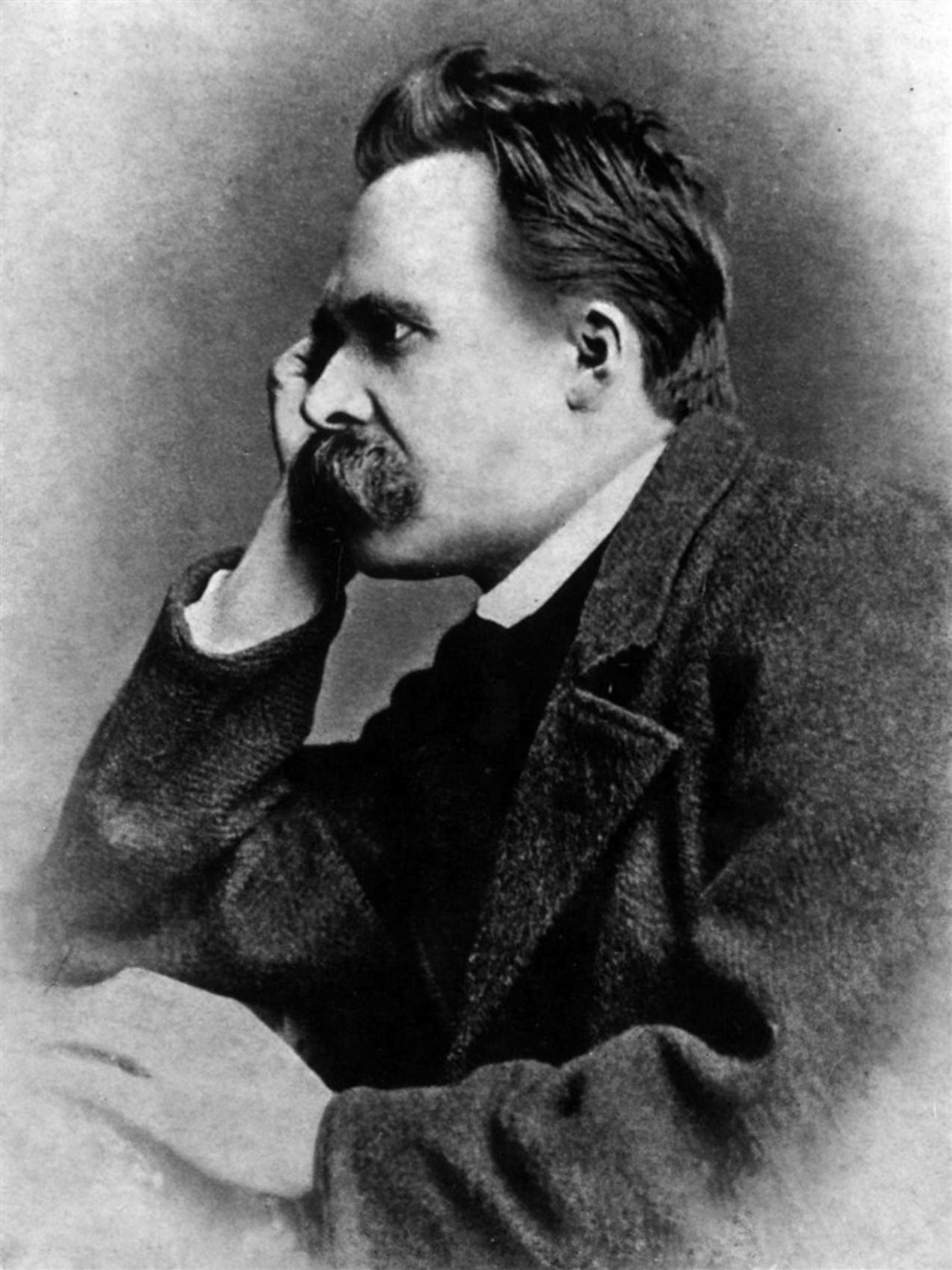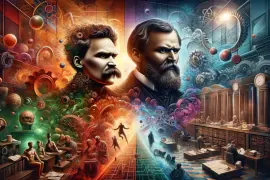
Friedrich Nietzsche

Friedrich Nietzsche's views and opinions on people and things
Friedrich Nietzsche's work has captivated and puzzled readers with its profound insights on ethics, truth, and the human condition. Often considered one of the most influential thinkers, Nietzsche challenged the foundations of traditional morality and deeply analyzed the fabric of society and culture, leaving a lasting impact on modern thought. His ideas offer a unique perspective on how you might confront life's challenges and affirm your own values in a complex world.
Nietzsche’s philosophical approach encourages you to question established doctrines, especially those that stifle life's vitality. His views on art and culture suggest that these are not just forms of entertainment but vital to the development and flourishing of society. Understanding Nietzsche means engaging with a style of thinking that is as literary as it is philosophical, one that reshapes the way you consider everyday life and your place in society.
Summary
- Nietzsche prompts you to critically analyse traditional values.
- His philosophy embraces life-affirmation through honest questioning.
- Nietzsche's influence persists in contemporary social and cultural discourse.
Nietzsche's Life and Influence
Friedrich Nietzsche's legacy spans across philosophy and culture, profoundly shaping the discourse on morality and existence. He left a mark not just through his works but also in the way he led his life and interacted with other intellectual giants of his time.
Biographical Background
Nietzsche was born in 1844 in Germany. He excelled in academia from a young age, eventually taking up a position as a classical philology professor before his philosophical career took precedence. His life was marred by illnesses, leading to his early retirement. It was during this period that he composed many of his seminal texts. Tragically, he spent the last years of his life in a state of mental incapacitation.
Influence on Philosophy and Culture
Nietzsche's writings, brimming with critiques of traditional European morality and theological constructs, earned him posthumous acclaim. His concept of "Übermensch" and critique of Christian morality stood out, influencing existential and postmodern thought. Nietzsche foresaw the dissolution of absolute truths with his declaration of the "death of God," reshaping 20th-century philosophy. Cultural critics, existentialists, and even psychologists have found his work pivotal in challenging preconceived notions of ethics and human potential.
Relationship with Other Philosophers
Throughout his life, Nietzsche was influenced by and critiqued various philosophers. He had admiration and subsequent disapproval for Richard Wagner, whom he initially idolized. Arthur Schopenhauer was a significant influence on him, particularly at the beginning of his intellectual journey. Moreover, Nietzsche's critical perspectives on Rousseau's ideas on democracy and equality manifest his contrasting views to the Enlightenment ideals, scrutinizing the implications of Rousseau's stance on modernity and individualism, which you can observe in his thoughts on Rousseau. Additionally, while Nietzsche found the ideas of Epicurus interesting, ultimately, he disagreed with them, reflecting the nuanced and often contentious relationships he had with past thinkers, illustrated in his examination of Epicurus's philosophy. Furthermore, the shadow of Nietzsche's philosophy extended to the works of Sigmund Freud, whose psychoanalytic theory bore the influence of Nietzsche's exploration of the depths of human psyche.
Central Philosophical Themes
Explore the core ideas of Friedrich Nietzsche's thought, where morality is scrutinized, ideals are overturned, and traditional values are put under the microscope. Prepare to confront his revolutionary concepts designed to liberate the human spirit and reshape society.
Morality and Ethics
Nietzsche's well-known work, On the Genealogy of Morality, dissects the origins and purpose of moral values. He views morality as a complex system imposed by the powerful, sculpting human behavior to serve their interests. Morality, for Nietzsche, lacks universal legitimacy; it's a social construct rather than an absolute truth.
Concept of the Übermensch
The concept of the Übermensch, or "Overman," features prominently in Nietzsche’s philosophy. It represents an individual who transcends traditional morality to create personal values, manifesting the highest potential of human creativity and life-affirmation.
Will to Power and Life's Affirmation
The Will to Power, a fundamental driving force in humans, dictates your actions and beliefs according to Nietzsche. It's not just a pursuit of dominance but a pursuit of self-overcoming and growth. Life's affirmation, in Nietzsche's view, means saying "yes" to existence in its entirety, embracing both joy and suffering.
Eternal Recurrence
Consider the hypothesis of Eternal Recurrence, a thought experiment where you imagine living life repeatedly in an infinite cycle. Nietzsche suggests that affirming life includes the acceptance of life in such a cycle—as an ultimate embrace of one's existence.
Critique of Religion and Science
Nietzsche famously declared "God is dead," illustrating the declining authority of religion in the modern world. He criticizes religion for promoting life-denying values, and extends this critique to science, for its potential to create new idols and limit the human spirit through rigid rationality.
Perspectives on Art and Culture
Friedrich Nietzsche's thoughts on art and culture are key to understanding his philosophy. His insights delve deep into the essence of human creativity and cultural evolution.
Art as a Representation of Values
Nietzsche saw art as more than aesthetic play; it was a reflection of the deepest values that shape human life. In his book The Birth of Tragedy, he suggests art unveils truths inaccessible to pure reason. Ecce Homo reveals his view of art as a vital force, a way to confront and transfigure life's suffering. For you, art becomes a medium through which your values are not only represented but also examined and understood.
Cultural Criticism
Nietzsche's cultural criticism emerged from his observation of the psychosocial underpinnings of art’s evolution. He often criticized the loss of vitality in the culture of his time, implying a disconnection from the genuine values that should animate societal expressions. His relationship and eventual fallout with Richard Wagner is exemplary of his critical stance towards the culture-makers of his era. Through cognitive empathy and psychological analysis, he urged you to see beyond the superficiality of culture, seeking a resurgence of its transformative power.
By interacting with Nietzsche's perspectives, you're invited to reflect on the role that art and culture plays in your life, illuminating paths that lead to richer, more authentic experiences.
Nietzsche's Literary and Philosophical Style
Friedrich Nietzsche's style is a fusion of literary eloquence and philosophical profundity. His works, such as Twiglight of the Idols and The Gay Science, demonstrate this unique amalgamation, offering you insights into his complex thoughts on culture and morality.
Aphorisms and Poetry
Nietzsche's use of aphorisms provides you with bite-sized yet profound insights into his philosophical musings. These short, pithy statements often encapsulate complex ideas in just a few words, making them memorable and thought-provoking. For example, in The Gay Science, you may find these aphorisms not only challenging but also crafting a rhythmic and poetical prose that echoes the conciseness of poetry.
Historical Analysis
Nietzsche employs a thorough historical analysis in his work to show you the transformations of moral and philosophical concepts over time. In his book Daybreak, he meticulously dissects past moral prejudices, allowing you to understand how current values have evolved from historical contexts. His writing beckons you to look at the origins of ideas to comprehend their present state.
Genealogical Method
Lastly, Nietzsche's genealogical method is a critical tool he uses to deconstruct the development of societal norms. This approach, particularly prominent in his work On the Genealogy of Morality, encourages you to trace the lineage of contemporary beliefs back to their roots. By engaging in this genealogical investigation, Nietzsche guides you to a deeper understanding of the often unnoticed assumptions underlying modern life.
Impact on Modern Thought and Society
You'll find that Friedrich Nietzsche’s legacy has profoundly shaped contemporary thought. His provocative ideas have both rattled and inspired the realms of morality, politics, and science.
Challenges to Traditional Morality
Nietzsche questioned the foundations of conventional morality, urging you to reconceptualize values in society. He argued that traditional morals could be life-denying, advocating for a reevaluation that celebrates life and vitality. This push for a reimagining of values is fundamental in understanding Nietzsche's impact on society and your own personal ethics.
Political Philosophy and Ideology
In political terms, Nietzsche’s notions of the 'will to power' and the 'übermensch' have infiltrated political thought. Although sometimes controversially appropriated, his scepticism towards mass democracy and socialism has infused debates on political structure and individualism in modernity, prompting you to ponder the ramifications for society.
Influence on Psychology and Science
Lastly, Nietzsche’s insights have left a significant mark on psychology and the human sciences. By dissecting the underpinnings of human behavior and introducing the concept of the unconscious mind, he prefigured many psychoanalytic ideas that your understanding of human nature now includes. This has inevitably influenced modern psychology’s approach to the self and society.
All articles






End of content
No more pages to load
